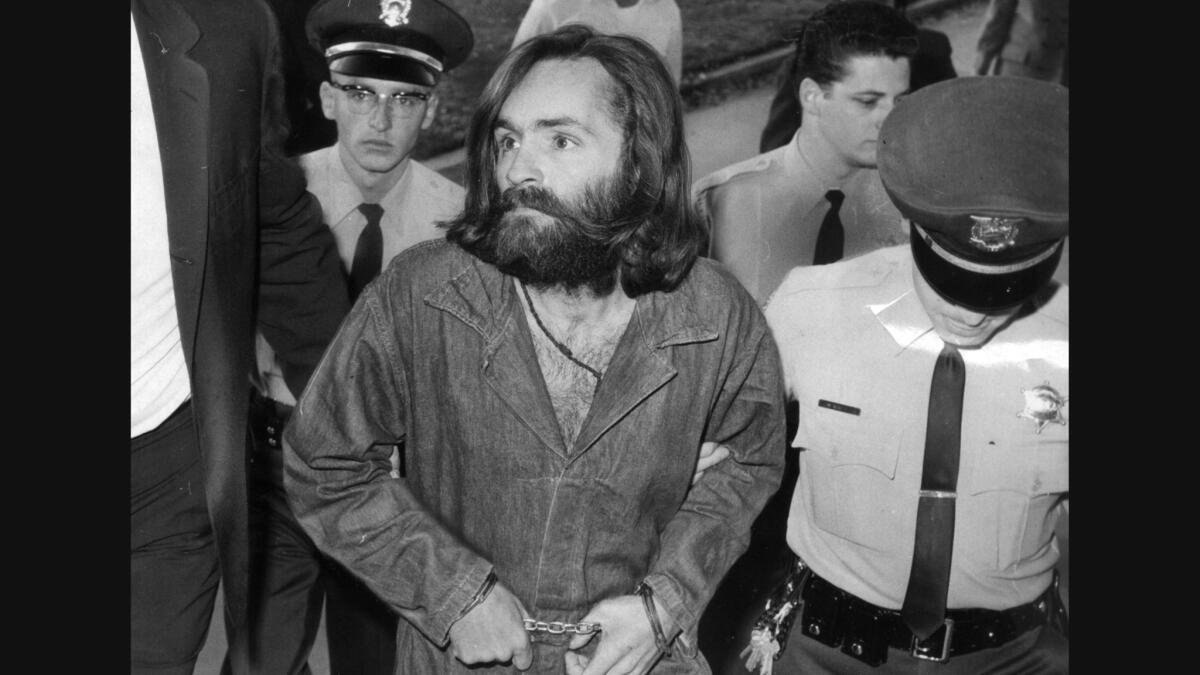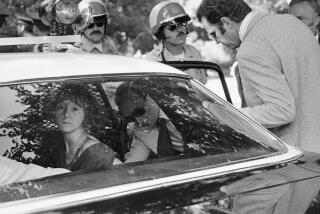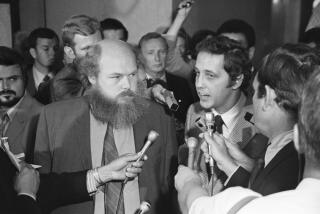Commentary: Charles Manson was a white supremacist. Why can’t pop culture seem to admit it?

The creepy, long-haired menace of Charles Manson and his murderous hippie cult is back, thanks in large part to the blockbuster feature “Once Upon a Time ... in Hollywood” and the return of Netflix’s heralded crime drama, “Mindhunter.”
Manson, who ordered his “family” of followers to massacre seven people over two nights in August 1969, is a formidable but largely unexplored presence in both productions.
In Quentin Tarantino’s film, his gruesome crimes represent the end of Flower Power idealism. In the streaming series, his story coincides with the beginning of America’s obsession with serial and spree killers. In both, he’s depicted as a singular, era-specific form of evil, the unexpected byproduct of the counterculture who espoused peace and love while sowing chaos.
Fifty years after the Tate and LaBianca murders, and nearly two years after his own death at the age of 83, Hollywood is still enamored with the notion of Manson as an enigmatic, somewhat groovy villain with otherworldly powers of persuasion.
“Once Upon a Time ... in Hollywood” takes our national addiction to nostalgia to dangerously high levels
It’s certainly a more bankable image than Manson the ignorant white supremacist who tattooed a swastika smack dab in the middle of his forehead — just above his pinwheel crazy eyes.
But that’s exactly who the diminutive man with the big mouth was: Manson was an aspiring member of the Aryan Brotherhood disguised in Haight-Ashbury threads, a neo-Nazi in moccasins, a scared white dude who feared displacement by an “inferior” brown or black race.
If the mythologized ‘60s madman were alive today, he’d have more in common with the El Paso Walmart shooter, New Zealand’s mosque gunman, the Charleston church killer and the litany of hateful voices allowed to proliferate on social media than with John, Paul, George or Ringo. Manson used the Beatles’ “Helter Skelter” as a descriptor for his own racist, homicidal manifesto because, like many of today’s dangerous bigots, he knew how to hide in plain sight.
Tarantino and David Fincher, executive producer of “Mindhunter,” couldn’t have been handed a more topical angle on the oft-told tale of Crazy Charlie and his dead-eyed girls. Had either chosen to explore this route, they’d have been among the few major productions to drag the issue of white domestic terrorism from its usual setting — a civil rights story or corrupt-police drama — and show it for what it is: an ugly reality that stretches from Chatsworth to Washington, D.C., whether dressed in militiamen’s camo or a suit and tie.
But in keeping with Hollywood tradition, both decline to seriously confront Manson’s white supremacist ideology — or unpack the role it played in his cult and his crimes. Manson remains a riddle, so untouchable that he scarcely appears in Tarantino’s film, while his motives for murder baffle the FBI’s Behavioral Science Unit in “Mindhunter.”
In the Netflix series, a wild-eyed, rambling Manson (Damon Herriman) flummoxes agents Holden Ford (Jonathan Groff) and Bill Tench (Holt McCallany) when they interview the incarcerated felon as part of a larger effort to understand the minds of serial killers.
They’ve already spoken to Son of Sam, the Coed Killer and other notorious predators with the goal of using what they find to help break ongoing cases, but Manson — who’s not technically a serial killer — seems to catch them off guard. Though the series begins to tear down Manson’s mystical aura, with the cult leader joking about the powers prosecutor Vincent Bugliosi claimed he had to stop a watch, it swiftly backs off. Ford and Tench end up in the same place as always, with Manson an unsolvable mystery.
The agents never bother to drill down into the depths of Manson’s bigotry, his open hatred of African Americans and how those feelings turn to murder. Instead, the men later appear to dismiss the notion that racism was near the root of the ’69 massacres: “What if the point of Helter Skelter wasn’t a race war? What if it was about control?” Ford asks.
No matter that the open cases the FBI hopes to solve in Season 2 are the Atlanta child murders, in which dozens of black boys are turning up dead and much of the local community has suspicions it may be the work of the Ku Klux Klan or a like-minded lone wolf. In this context, positioning Manson as a fascinating anomaly, more interested in manipulation than his vile beliefs, seems particularly ill-considered — a missed opportunity to explore the bitter truth that’s plaguing our culture, our schools, our malls.
Season 2 of Netflix’s “Mindhunter” re-examines the killings of two dozen black youths in Atlanta from 1979 to 1981. But no victims’ families were consulted in the process.
“Once Upon a Time ... in Hollywood” is too busy with free love at Spahn Ranch to even flick the ideological foundations of the group or its dark mission. It’s a notable omission, given that the film satirizes the era’s racist stereotypes of Mexicans and, as some have argued, does its own stereotyping in its depiction of Bruce Lee.
The mythology built up around Manson by the media, Hollywood and the man himself is understandable. He was a con man and pimp who got nice, middle-class kids to follow him, sleep with him and murder for him.
But there’s more to the story, and it informs where we are today. He used the “erosion” of white America to justify the senseless massacre of innocents.
“I keep being reminded of Charlie Manson when we see white supremacist groups,” Jeff Guinn, author of “Manson: The Life and Times of Charles Manson,” told Newsweek back in 2017. “It’s almost like they’re copying the Charles Manson playbook.”
The notoriety Manson hoped to achieve as a rock star in the 1960s came to him instead through the gruesome killings of August 1969 — and the nation’s insatiable appetite for lurid details about those crimes and his free-love commune.
Now Hollywood’s giving him a comeback tour, no tough questions asked.
More to Read
The complete guide to home viewing
Get Screen Gab for everything about the TV shows and streaming movies everyone’s talking about.
You may occasionally receive promotional content from the Los Angeles Times.







